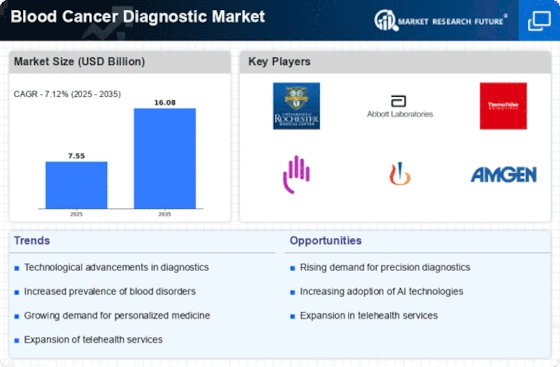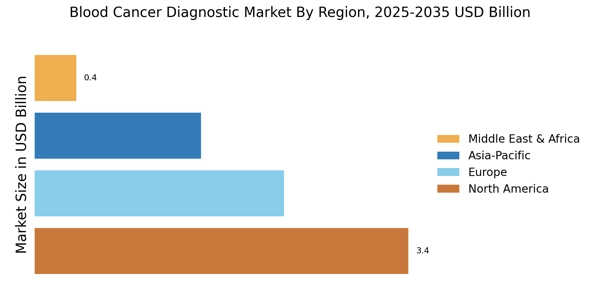Rising Incidence of Blood Cancers
The increasing incidence of blood cancers, including leukemia, lymphoma, and myeloma, is a critical driver for the Blood Cancer Diagnostic Market. According to recent statistics, the prevalence of blood cancers has been on the rise, with an estimated 1.3 million new cases reported annually. This alarming trend necessitates the development and implementation of effective diagnostic tools to facilitate early detection and treatment. As healthcare systems worldwide strive to address this growing challenge, investments in diagnostic technologies are expected to increase. The demand for accurate and timely diagnostics is likely to propel the Blood Cancer Diagnostic Market forward, as healthcare providers seek to improve patient outcomes and reduce mortality rates associated with these malignancies.
Growing Awareness and Education on Blood Cancer
There is a notable increase in awareness and education regarding blood cancers, which is positively influencing the Blood Cancer Diagnostic Market. Campaigns aimed at educating the public about the symptoms and risks associated with blood cancers are gaining traction. This heightened awareness encourages individuals to seek medical attention sooner, leading to earlier diagnoses. As a result, healthcare providers are increasingly adopting advanced diagnostic technologies to meet the rising demand. The market is projected to grow at a compound annual growth rate (CAGR) of 8% over the next five years, driven by this increased awareness. Furthermore, collaborations between non-profit organizations and healthcare institutions are fostering educational initiatives that further enhance the visibility of blood cancer diagnostics.
Integration of Telemedicine in Diagnostic Services
The integration of telemedicine into diagnostic services is emerging as a transformative driver for the Blood Cancer Diagnostic Market. Telemedicine facilitates remote consultations and follow-ups, allowing patients to access diagnostic services without the need for in-person visits. This trend is particularly beneficial for individuals in remote or underserved areas, where access to specialized healthcare may be limited. The convenience and efficiency of telemedicine are likely to increase patient engagement in their healthcare journeys, leading to more timely diagnoses. As telehealth platforms continue to evolve, they are expected to incorporate advanced diagnostic tools, further enhancing the capabilities of the Blood Cancer Diagnostic Market. The potential for telemedicine to bridge gaps in healthcare access could significantly influence the market landscape in the coming years.
Technological Innovations in Blood Cancer Diagnostics
The Blood Cancer Diagnostic Market is experiencing a surge in technological innovations that enhance diagnostic accuracy and efficiency. Advanced techniques such as next-generation sequencing (NGS) and liquid biopsy are revolutionizing the way blood cancers are detected. These technologies allow for the identification of genetic mutations and biomarkers associated with various blood cancers, leading to more personalized treatment approaches. The market for NGS alone is projected to reach USD 10 billion by 2026, indicating a robust growth trajectory. Furthermore, the integration of artificial intelligence in diagnostic tools is streamlining data analysis, thereby improving the speed and reliability of diagnoses. As these technologies become more accessible, they are likely to drive the expansion of the Blood Cancer Diagnostic Market significantly.
Regulatory Support and Funding for Diagnostic Research
Regulatory support and funding for research in blood cancer diagnostics are pivotal factors driving the Blood Cancer Diagnostic Market. Governments and health organizations are increasingly recognizing the importance of innovative diagnostic solutions in improving patient care. Initiatives aimed at providing grants and funding for research projects are becoming more prevalent, facilitating the development of novel diagnostic tools. For instance, recent funding allocations have focused on enhancing the capabilities of existing diagnostic technologies and supporting clinical trials for new products. This financial backing is likely to accelerate the introduction of advanced diagnostics into the market, thereby expanding the Blood Cancer Diagnostic Market. As regulatory bodies continue to streamline approval processes for new technologies, the market is expected to witness significant growth.

















